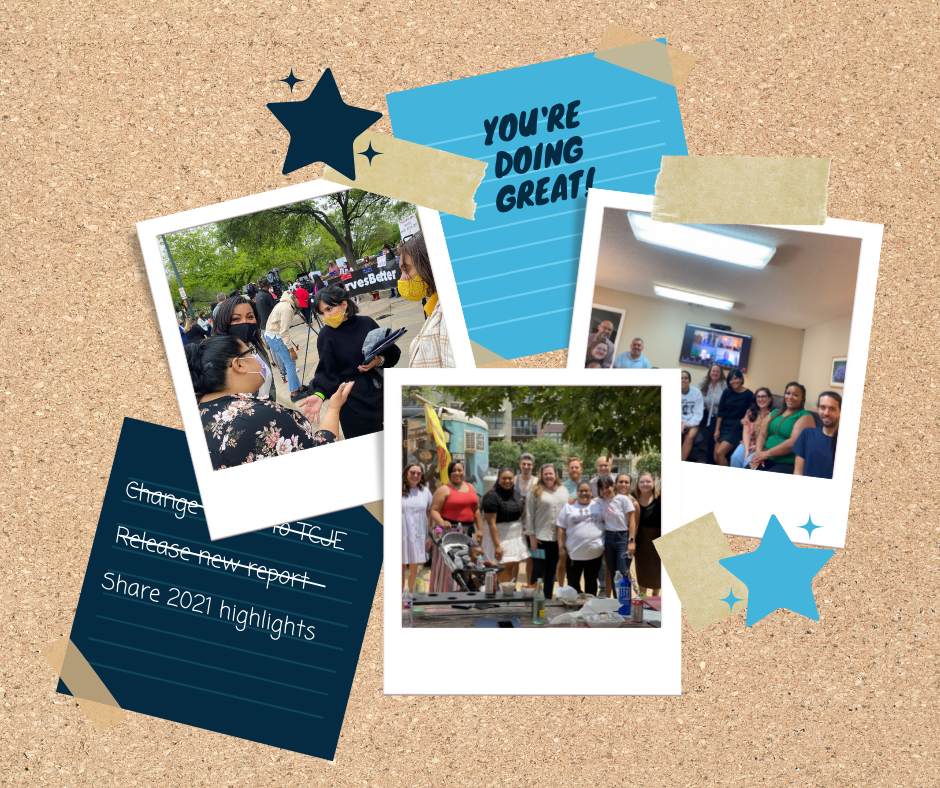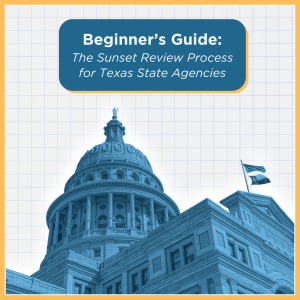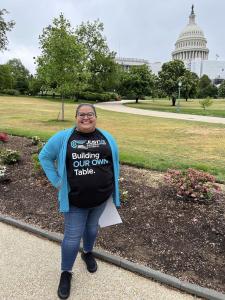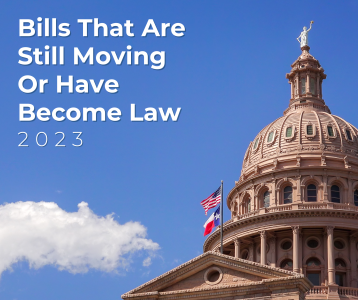2021 in Review: A Year of Transformation at TCJE

I’m sure you’ve seen the posts all across social media: it’s the time of year when people reflect. They’ll share their most heard songs (mine: “Jackson” cover by Trixie Mattel and Orville Peck, “Jerome” by Lizzo, “The Six” by the Six the Musical cast). Or they might note personal accomplishments from the year (mine: a lot of homemade empanadas and one truly phenomenal maple pecan pie).
For our organization, there’s also a lot to reflect on. It’s been a year of challenges as Texas leaders have refused to act on vital justice issues and as COVID-19 continues to upend our world. But it’s also been a year of transformation, renewal, achievement, and abundance. Below, as we share some of these triumphant moments, we invite you to take a peek behind the scenes into TCJE, and to share your own hardest-fought wins from 2021 with us on social media!
A new chapter for TCJC/E. In September, we officially changed our name from the Texas Criminal Justice Coalition to the Texas Center for Justice and Equity. The switch, which was years in the making, also came with a new website (where you’re reading this right now!) as well as an agenda focused on collective leadership: building community power through education and mobilization, and centering impacted voices in our reform priorities. But even before we became TCJE, we were planning for the future. The highlights:
- During the regular legislative session, we hosted a virtual Justice Week: five days of videos, explainers, lobby days, and more to focus on our key issues. Throughout the session, we also laid the groundwork for the future with our “beginner’s guide” blog series and key definitions on our social media. And after session, we shared what’s become one of our most popular publications: our Bill Analysis Guide.
- As the lawmakers wrapped up the regular session, our team gathered for a scenic retreat. We grilled, chatted by the river, and gave treats to some of our office dogs.
- After a much-needed break, we got right back to work with days of organizational strategizing. Through multiple sessions and hundreds of Post-It notes, we mapped out the future we’re fighting for.
- In September, we celebrated our rebrand with the launch of www.TexasCJE.org, a streamlined website where you can find all the previous reports and resources you relied on, plus new areas like our supporter hub and justice glossary. We shared more about our new name and vision here on our blog, on our About Us page, in a press release, and on our social media pages.
- Through it all, our team has been hosting regular meetings of a new organizational book club. It’s a chance for us to have frank, in-depth discussions on the issues we care about. This fall, we read We Do This ‘Til We Free Us, a crucial collection of works from abolitionist writer and activist Mariame Kaba.

Young leaders on the rise. Some of our key advocacy highlights from 2021 feature advocates we admire: namely, young leaders who are insisting on a place at the table.
- After pushing for a community reinvestment fund in Harris County (Houston) to help kids avoid incarceration and remain successful after release, we were thrilled when the county announced a $4 million investment in support of local programs! It’s vital to keep kids out of the system on the front end and give them the support they need to thrive, and also to ensure that system-impacted kids and their parents have a central voice in these efforts.
- In Dallas, our county director Leon has maintained his Perception Equals Potential (P.E.P.) Initiative to address school disciplinary practices that over-impact kids of color. This year, that included a youth empowerment camp where kids could access everything from wellness sessions to Tai-Chi. Leon’s also been hosting listening sessions to hear directly from students, parents, and teachers on what schools need to do to keep kids on the right path, and he’s been building support for a pilot program for 9th graders. Stay tuned for more exciting work from Dallas next year!
Accountability and data in the adult system. In 2021, we released some unique resources focusing on the adult system.
- After our original joint report on arrests for possession of a controlled substance in small amounts in Travis County (Austin), the team wanted to delve deeper. With January Advisors, we created a data story that maps these arrests across the county, and overlays social vulnerability factors to provide a clearer picture of what drives arrests and incarceration. The visualization helped to highlight some important—and concerning—facts about police saturation and its effects in Austin. We also hosted a webinar on local policing practices with guests from Grassroots Leadership and Texas Harm Reduction Alliance, and Policy Analyst Sarah shared a blog post on lessons learned from the data story.
- In Harris County, we released a groundbreaking report analyzing the misinformation, false narratives, and bias in the media’s coverage of misdemeanor bond reform. Authors Elaine and Ben evaluated over 200 articles from six local TV stations released over 6 years; their findings and annotations are available on our interactive web pages. Ben also wrote a blog post on the project, and we shared a petition demanding unbiased coverage from the English-language stations we analyzed.
- Also in Harris County, our team has continued our partnership with researchers from Harvard to release weekly personalized scorecards for a set of local judges. The scorecards, which note the racial makeup of the people that felony judges detain based on inability to pay bond, are sent directly to each judge in addition to being published on our site. Along with our weekly pretrial detention reports (produced with Texas Organizing Project) and monthly indigency appointments reports (produced with Restoring Justice), these scorecards are available on our Harris County judicial accountability page.
- As part of a longer-term research project on Texas’s in-prison substance use treatment programs (Substance Abuse Felony Punishment, or SAFP, facilities), we released a report highlighting participants’ alarming experiences. “Layers of Trauma, Layers of Treatment” included recommendations to limit program placement and improve oversight and evaluation; it is available on our website here.

Women’s justice wins. Our women’s justice work was the source of some significant bright spots during a difficult legislative session.
- The Texas Women’s Justice Coalition, and particularly our team members Cynthia and Maggie, championed a family reunification bill during session. HB 2926 creates a pathway to family reunification for children whose parents have been incarcerated—and it is now LAW! Read Cynthia’s blog post on the importance of this legislation, and check out our infographic here.
- In Travis County, Cynthia and Maggie also joined a group of formerly incarcerated women and other local advocates who stood in opposition to a proposal for a new women’s jail. Once again, they delivered a win, with county commissioners deciding to table the plans for a new facility and reevaluate their strategic plan!

Closest to the problem, closest to the solution. Part of our rebrand includes a focus on elevating the voices of people who’ve been personally affected by the criminal legal system. But even before our name change, this was a key part of our work in 2021.
- Our Statewide Leadership Council (SLC) continued to grow this year, with visioning sessions in communities across the state. Coordinated by Maggie and featuring leadership from formerly incarcerated Texans and loved ones, the SLC also had a major presence during this year’s regular legislative session. As part of the Clean Slate Texas campaign, they advocated for Clean Slate and “New Wings” legislation that would automate and expand eligibility for nondisclosure of records, creating meaningful second chances for so many Texans. The SLC will continue its advocacy for these reforms—including with help from Movement Labs, who selected the SLC as one of just 12 groups in the nation to receive advocacy texting support to grow in size and power!
- We also released our “Let Me Explain” video series, in which people impacted by the youth and adult systems shared their stories directly. Their stories showed hope, resilience, and a determination for a brighter future.
Of course, this list is just a small piece of everything we’ve worked on in the past year. As we head out for the holidays, I’m reflecting on how proud I am to be a part of this incredible team—and I hope you’ll keep following along for the challenges and victories that 2022 is sure to bring!



